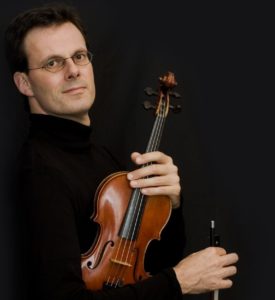The Fremantle Chamber Orchestra are celebrating 15 years of music making. Rosalind Appleby talks to founder Hans Hug, the adrenalin junkie who is hooked on music.
Plenty to celebrate
6 January 2020
- Reading time • 7 minutesMusic
More like this
- Rewriting tradition with skill and charm
- Close encounter stirs the soul
- The great unknown
Rosalind Appleby: Playing cello is not your day job, Hans – what has inspired you to keep music part of your life, both in Switzerland and since you migrated to Perth in the eighties?
Hans Hug: I am hooked on making music. It’s the most exciting thing I know; everything is alive. Yes, the printed notes may be old but each player has to contribute before hearing any other players otherwise we’d all lag. So at the moment of playing the whole orchestra is alive. It’s an adrenalin high. And it’s so fantastically beautiful.

RA: The Fremantle Chamber Orchestra is celebrating its 15th anniversary next month. Why did you found the orchestra?
HH: I love the fact that a chamber orchestra is smaller and plays a different and exciting repertoire. In 1988 I migrated to WA from Switzerland where I had been playing in a fine chamber orchestra. In 2005 a friend (Bob Sommerville) asked me to organise a concert with guitarist Milica Ilić who had just finished UWA with first class honours. Encouraged by two professional musicians with whom I did wedding gigs, I agreed. But nobody wanted to sign up to the unknown Fremantle Chamber Orchestra and the promotion for the first two concerts was already in full swing. Finally I asked Ollivier-Philippe Cunéo with whom I played piano trio and Rebecca Glorie (then White) and suddenly musicians signed up and we had an orchestra together.
RA: What was your first program back in 2005?
HH: The small band performed Beethoven’s Coriolanus Overture, Rodrigo’s Aranjuez Guitar Concerto and listeners were so blown away they flooded the green room. After the interval, Miliza played some charming solo works. We finished with Beethoven’s first Symphony again tight and with energy. Basically, as there wasn’t a chamber orchestra in WA at the time and because of the enthusiastic feedback, FCO is still going strong 15 years later.
RA: You have built connections with musicians around the world – how did Rudolf Koelman become involved with the orchestra?

HH: I was a student at the Conservatory of Lucerne in Switzerland, my hometown. I was walking through the underpass in front of the train station when I heard a violin being played like I had never heard one before. It was Rudolf busking. I gave him a five Swiss franc coin and we started talking and became friends. He played at my wedding in Lucerne and I recorded his concerts on a walkman. When I came to WA, we lost contact but I found out he was a professor at ANAM. So the following year he came to WA to perform with FCO.
RA: Tell me about the program you have put together for your 15th anniversary concert.
HH: FCO on its own can play wonderfully but when Rudolf joins, he lifts the entire band. His specialty is the romantic period and we agreed he would play Saint-Saëns 3 in keeping with our goals of presenting works that are not often played but beautiful and that we haven’t performed yet. We believe Mendelssohn’s Fair Melusine Overture instantly attunes listeners to romanticism further explored by the concerto. After the interval, we celebrate FCO’s first conductor Ollivier-Philippe Cunéo’s foray into composition Le verre siffleur, which has one of the most exquisite passages in music. Its reflection on the Paris massacres is also very touching. To contrast and complement further we will finish with an early Mozart symphony, his No 6. I listened to over 20 rarely played early Mozart symphonies and found this one particularly appealing.
RA: What do you hope the audience will experience?
HH: I hope the audience will be able to experience exciting, energising and beautiful music. We offer fresh interpretations of rarely heard and famous works put together in a way that is interesting and beautiful.
RA: Where did you learn the skills to run an orchestra?
HH: I helped run the orchestra in Switzerland and in 1994 I organised the first concerts in Australia with then violinist Caitlin Hulcup, Geoffrey Bourgault du Coudray and other music students in their final year. One job follows the next so I learnt on the job really.
RA: Are you able to pay your musicians?
HH: Yes, we are able to pay the musicians but it is a fraction of what they are getting everywhere else and deserve. FCO lacks proper funding (not because of lack of trying and applying) and so it’s a constant struggle to balance the books. After the concerts with Rudolf, we might have to present some programs reduced in size with no or very few wind players.
RA: What does the future hold?
HH: I hope we can continue to explore and present beautiful music of rarely or never played works as well or popular works, always with a fresh interpretation and to provide an experience to listeners that they thoroughly enjoy and feel uplifted and enriched by.
Pictured top: The Fremantle Symphony Orchestra at Government House Ballroom.
Like what you're reading? Support Seesaw.






